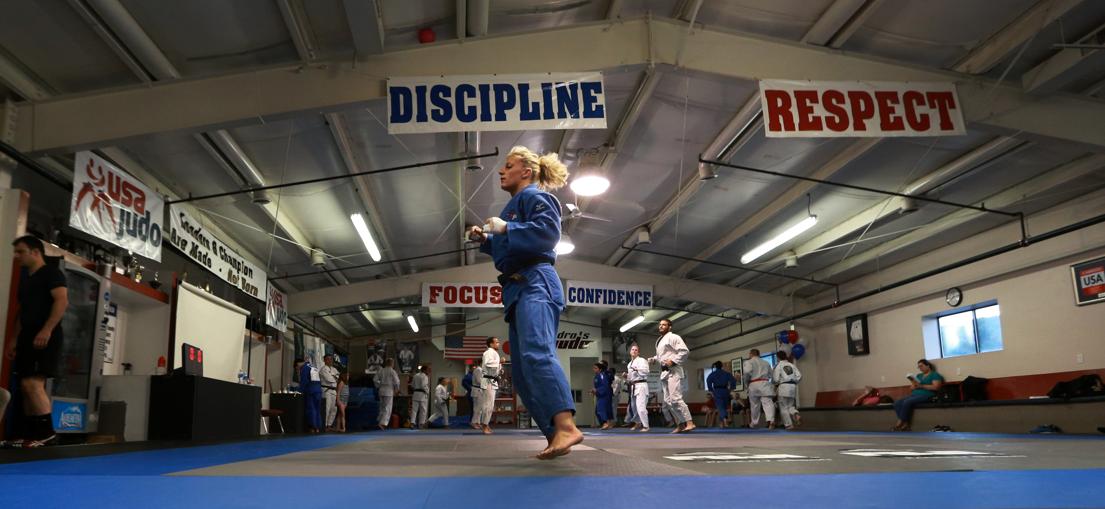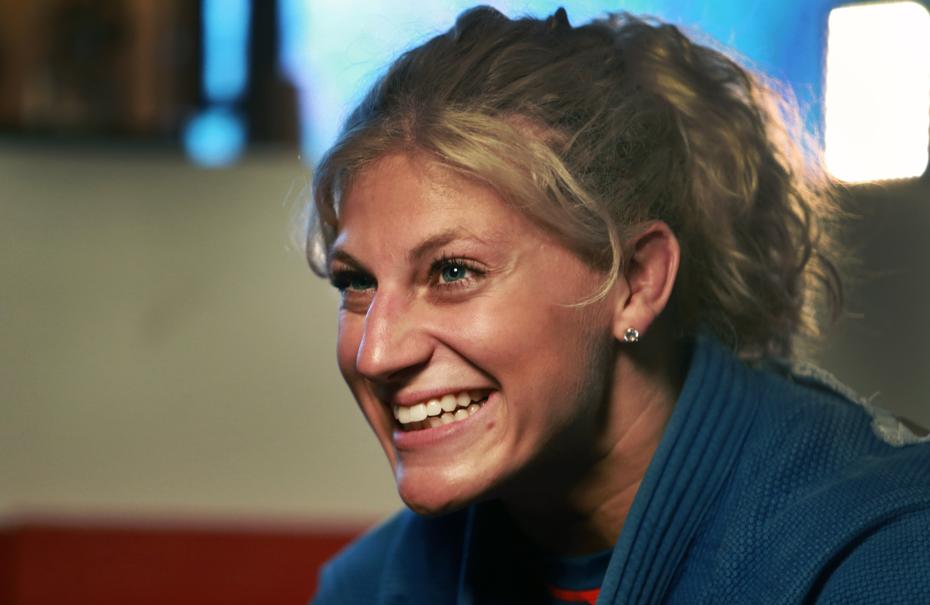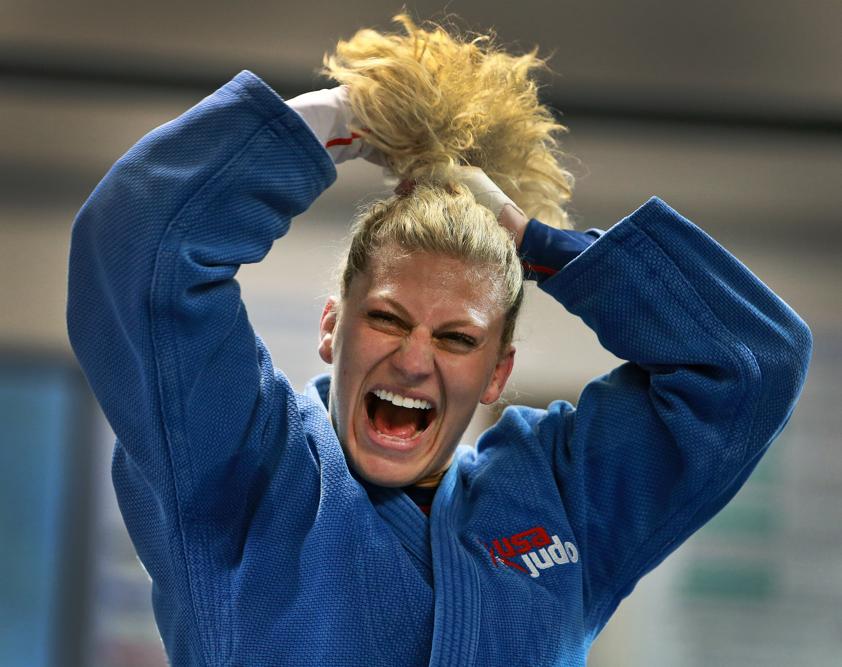


There is a blur of arms and legs and a blond ponytail, then a hard body slam that shakes the floor of Pedro’s Judo Center in Wakefield. Kayla Harrison looks down at her male training partner. He is lying on his back, recovering, and seems to be checking that all of his limbs remain attached. Harrison stands unfazed, all uncoiled strength and purposeful aggression.
Over the next 20 minutes, she throws her training partner to the floor over and over and over again. Each time, it’s quick and vicious and mesmerizing. It’s also jarring in another way. Harrison looks and acts nothing like the talkative, self-deprecating, joke-telling, charming 26-year-old that she is away from the mat.
When asked why she decided to train for the 2016 Rio Olympics after winning gold in 2012, she cracked, “Because I’m crazy. Because I’m a glutton for punishment.’’
But there is more than a little truth in her humor. Harrison knew the road from London to Rio would test her body, mind, and soul, especially when she needed reconstructive knee surgery. And she expected the distractions that come with the title “Olympic champion.’’
True to her stubborn nature, Harrison didn’t want to give up the chance to make history. In London, she became the first American judoka to win Olympic gold. If she repeats as Olympic champion, she will be the first female from outside Asia to claim consecutive judo titles.
“I didn’t want to look back on my life 10 years from now, 15 years from now and think I probably could have done it again and wish that I had,’’ said Harrison. “I’m the type of person who wants to live my life fully and completely and have no regrets.
“I knew that I still had something left in the tank and I knew I had an opportunity to not just be one of the greatest judokas America has ever seen, but maybe potentially the world, leave behind a legacy. And I was right. I still had something left in the tank.’’
A gold medal changes an athlete’s life, and often their priorities. There are more demands on their time, more money, more motivational speeches to give, more eyes scrutinizing every move in and out of competition and, yes, more fun. That was all true for Harrison.
Her hometown of Middletown, Ohio, threw a parade in her honor, gave her a key to the city, and asked her to give pep talks at every elementary school in the area. She won the Wilma Rudolph Courage Award from the Women’s Sports Foundation. Glamour magazine named her one of its “Women of the Year.’’ She attended the Country Music Awards with Kix Brooks. She went from “not really being financially stable’’ to paying more in taxes than she earned the year before the Olympics.
Harrison also became a high-profile figure in the fight against child sexual abuse.
Her former coach, Daniel Doyle, started sexually abusing her when she was 13. After three years of torment, she told a friend what was happening. In November 2007, Doyle pled guilty to illicit sexual conduct in federal court and received a 10-year prison sentence.
Leading up to the London Olympics and afterward, Harrison shared her story with larger and larger audiences, turning the most traumatic experience in her life into the ultimate source of strength.
“The worst has already happened to her in her life,’’ said Harrison’s coach, Jimmy Pedro, a two-time Olympic bronze medalist. “The battles with the demons that she had to fight to overcome that period of time, no judo match, no sporting event can compare to the type of pressure and anguish she already went through.
“So if she already went through that situation and moved past it, you now have an athlete who came from a point of not wanting to live life and not having two nickels to rub together to an athlete who is confident and strong and successful.’’
But with all of her commitments and activism after London, it wasn’t easy to refocus and return to the grind of training — the weeks of traveling from tournament to tournament, and the two to four workouts a day when not on the road. But Harrison embraced the challenge and reclaimed her No. 1 ranking in the 172-pound weight division after her knee surgery.
“My mentality is a bit different, because going in as defending Olympic champion, the pressures are different,’’ said Harrison. “Body-wise it’s different. I’m four years older. I have a lot of wear and tear on this body.
“The training has been a lot smarter, more about the quality versus the quantity. Whereas I kind of had to pay my dues before London. I had to get experience, experience, experience. This time around, I have the experience and I know how to win. It’s just staying competition-sharp and staying ready.’’
Major injury
“Wear and tear’’ is one way to describe what happened to Harrison’s body in her pursuit of a second gold medal. But it would be wholly inadequate.
Harrison took a break after the 2012 Games, thought about her future, then resumed training in January 2013. In preparation for that summer’s World Judo Championships, the intensity of her workouts increased. Then one day in May, Harrison got out of bed and her knee gave out.
Tests determined that major reconstructive surgery was the best course of action, really the only option that could get Harrison back on the mat. But there were no guarantees with a procedure that involved realigning her kneecap and, as she said, “other crazy stuff.’’
It wasn’t until much later — after six weeks basically on bed rest in a straight leg brace — that she fully grasped the seriousness of the injury and the repair.
“I didn’t move for six weeks,’’ said Harrison. “Then, I got scared. I was like, ‘Uh, what did I do?’ Because I didn’t understand the gravity of the situation.
“It was a pretty dark period. I just didn’t know who I was without judo. Then there was this whole period of time where I didn’t know what I was going to do. And I didn’t know if I was ever going to be able to step on a mat again and do what I loved.
“And it really made me have a very deep appreciation for judo. It also made me find out other things about myself.’’
When not doing physical therapy, she took classes at Harvard Extension School. Her favorite one was “Intro to Memoir,’’ where she listened to other people’s stories and wrote about her own.
It was a year before Harrison was physically ready to compete again. At her first tournament back, she was terrified. She wasn’t sure she would be the same athlete, whether she could trust her knee, whether she could beat the best judokas in the world.
She talked to her coaches and mentors, Jimmy Pedro and his father Jimmy Pedro Sr. They told her to take it one minute at a time, one match at a time. Harrison won the tournament.
“I think the knee surgery may have been a blessing, to be honest,’’ said Jimmy Pedro. “If she wasn’t injured and she didn’t have to go without judo for such a long period of time, she may have gotten burned out.’’
Future options
Away from the mat, Harrison switches quickly between intense enthusiasm for judo and calm reflection on a lifetime devoted to the sport. While she hasn’t thought much beyond Aug. 11 — the date of the gold medal match in her weight class — she knows she will keep telling her story after these Olympics, keep pushing for awareness of child sexual abuse through her Fearless Foundation. She has big plans for the foundation and the programs it will fund.
“Speaking all over this country, one of the things I realized is that there are so many groups who are doing really amazing work, but they’re all in very local, regional level,’’ said Harrison. “There is no Susan G. Komen for survivors of sexual abuse. There is no Livestrong. There is no huge organization where we can say, ‘OK, I want to donate my time, my money, and my effort into ending this.’
“So I started a foundation. The goal is to shine a light on what sexual abuse is and help survivors in dealing with it.’’
As for judo, she recently reached an agreement with USA Judo for the rights to organize and operate the US national championships for five years beginning in 2018. She also will start a new tournament, the Kayla Harrison Cup. (“Maybe if you win, you win Kayla,’’ she joked. “Maybe a mug with my face on it.’’)
There is also the lure of lucrative Mixed Martial Arts. She could follow the path of MMA star Ronda Rousey, an Olympic bronze medalist in judo who once trained with the Pedros.
“I think about it,’’ said Harrison. “It’s something I’m going to discuss with Big Jim and Jimmy and my manager and we’ll make a decision. But right now, my focus is the Olympics. We’ll see.
“From a money standpoint, of course it does [have appeal]. Who doesn’t want to be rich and famous at some point in their life?
“So there’s always that draw and that appeal. In terms of actually getting in a cage and trying to kill someone, I don’t know.’’
“I’d rather see her be an ambassador for judo than to get into a mixed martial arts ring and fight,’’ said Jimmy Pedro. “Because Kayla cares about people. She’s a nice person.
“I just don’t see her getting in a ring and bashing someone’s head in. It’s not who she is. But if the money is right and there’s no other way to make a living, then she may not have a choice.’’
For now, she has chosen judo, committed completely to its unglamorous grind. And she hopes those floor-shaking throws in a tiny dojo in Wakefield lead to history on the mat in Rio.
Shira Springer can be reached at springer@globe.com. Follow her on Twitter @ShiraSpringer



